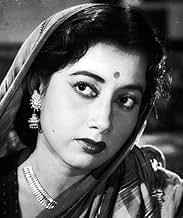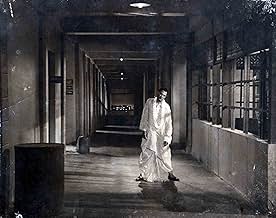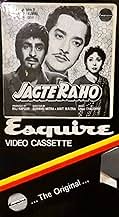Jagte Raho
- 1956
- 2h 33min
VALUTAZIONE IMDb
8,1/10
1138
LA TUA VALUTAZIONE
Aggiungi una trama nella tua linguaAn innocent guy who has arrived from a village to Kolkata gets himself involved into trouble in search of water after he gets thirsty in the middle of the night.An innocent guy who has arrived from a village to Kolkata gets himself involved into trouble in search of water after he gets thirsty in the middle of the night.An innocent guy who has arrived from a village to Kolkata gets himself involved into trouble in search of water after he gets thirsty in the middle of the night.
- Regia
- Sceneggiatura
- Star
- Premi
- 1 vittoria e 1 candidatura in totale
Pahadi Sanyal
- Shashan - Meenu's husband
- (as Pahari Sanyal)
Sulochana Chatterjee
- Meenu
- (as Sulochana Chaterjee)
Iftekhar
- Chandu (Leader)
- (as Iftikhar)
Moni Chatterjee
- Baral Babu
- (as Moni Chaterjee)
Recensioni in evidenza
What worked:
- screenplay is relevant and fresh, and can be analyzed in any generation. The movie theme is powerful, engaging and brutal. The lead actor has shown grace and depth to the character which makes it a believable narrative. The story is unique and powerful storytelling makes it a wonderful watch.
- glorified scenes and setting; maybe many scenes of the movie are superficial and feels like an unreal setting. The chase and run scenes feel repetitive and less creative. However, the final result of the movie is a powerful watch.
Jagte Raho is the simple story of a naive peasant who in hopes of improving his lifestyle, a poor peasant re-locates to Bombay virtually penniless. It is late at night and he is thirsty, and he is unable to find water anywhere. Then he sneaks into a multi-storied apartment complex, and is mistaken for a thief. The complex consists of over 200 units, and is housing nearly a 1000 people they all set out to hunt him down. Whilst evading capture, he inadvertently exposes the venality and dishonesty of the building's middle class occupants.
The film shows the double standards of our society, the cruelty and the corruptness, but not in a stereotypical way. It is natural and real. This naive peasant represents the simple common man who becomes a victim for no fault of his own. He encounters different sorts of thefts and crimes committed by those so-called "respectable" citizens of the city, those who call him a thief and chase him just because he yearns for a few drops of water so that they can hide their own misdemeanors. This is so unbelievable yet so true.
The character of the naïve peasant requires great facial expression as it don't have many dialogues but he emotes constantly, and Raj Kapoor being a Theater person have brilliantly achieved this.
I think that to analyze this film, firstly one has to understand the social environment of that era. During that time people where migrating to metros in search of jobs and stable life. However here they become victim of the bourgeois society. Film-Maker has very brilliantly weaved the beautiful story in this concept. I liked the metaphors used in the film which creates an impact on the viewer. Like a character of a child in a climax is a metaphor of new beginning. There are many more such metaphors in this film. There are sometimes when overuse of background scores have spoiled the impact of the emotions. Sometimes the acting is also too dramatic and theatrical to digest. However I also think that this is deliberated by the director as during those times audience demand such things which I can say after watching films from those era.
The film shows the double standards of our society, the cruelty and the corruptness, but not in a stereotypical way. It is natural and real. This naive peasant represents the simple common man who becomes a victim for no fault of his own. He encounters different sorts of thefts and crimes committed by those so-called "respectable" citizens of the city, those who call him a thief and chase him just because he yearns for a few drops of water so that they can hide their own misdemeanors. This is so unbelievable yet so true.
The character of the naïve peasant requires great facial expression as it don't have many dialogues but he emotes constantly, and Raj Kapoor being a Theater person have brilliantly achieved this.
I think that to analyze this film, firstly one has to understand the social environment of that era. During that time people where migrating to metros in search of jobs and stable life. However here they become victim of the bourgeois society. Film-Maker has very brilliantly weaved the beautiful story in this concept. I liked the metaphors used in the film which creates an impact on the viewer. Like a character of a child in a climax is a metaphor of new beginning. There are many more such metaphors in this film. There are sometimes when overuse of background scores have spoiled the impact of the emotions. Sometimes the acting is also too dramatic and theatrical to digest. However I also think that this is deliberated by the director as during those times audience demand such things which I can say after watching films from those era.
This Movie is a masterpiece.Why? The user before me already explained before me. I am from Bengal & Satyajit Ray obviously occupies a very high place in my heart. But Raj Kapoor was also unparalleled in his own domain. First person to introduce dream sequence in a song, First person to shoot a movie outside of his country & finally Bobby the movie which ushered in the whole era of teen romance. This movie exposes the mask that the so called good people wear in our society , the sanctimonious ones with holier than thou attitudes. However one thing I have to say about this that the Bengali version is just brilliant. Role which is played by Motilal in the Hindi Version is played by Chabbi Biswas. Chabbi Biswas if anyone has seen him will know that he was& still is the best actor in India.He was an actor of caliber who told Ray, when he was been instructed by Ray in the movie Jalshaghar, that not to tell him what his job was. Coming back to the movie if anyone manages to watch the Bengali version of this movie please do.Its way better than the Hindi Version.
Jagte Raho is one of the most amazing classics of Indian cinema. It is sad, comic, tragic, humorous, authentic, educative and entertaining. This magnificent social dramedy relates the story of one poor and innocent peasant who comes to the big city of Bombay in hopes of improving his life. However, while looking for some water to quench his thirst, he is constantly branded a thief by the citizens of the city and chased like a criminal. Looking for a hideout, still thirsty and hungry, he enters an apartment building, running from one flat to another, and ironically, every flat he hides in, he meets different "elite" citizens, all of whom can be easily called thieves.
The film shows the double standards of our society, the cruelty and the corruptness, but not in a stereotypical way. It is natural and real. This naive peasant represents the simple common man who becomes a victim for no fault of his own, not only in India but in the entire world. He encounters different sorts of thefts and crimes committed by those so-called "respectable" citizens of the city, those who call him a thief and chase him just because he yearns for a few drops of water so that they can hide their own misdemeanors. This is so unbelievable yet so true.
Raj Kapoor is the film's main protagonist and may I say, this is one of the finest works of his career, both as a filmmaker and particularly as an actor. The fear in his eyes is so haunting. You really feel for him as you witness his pain, his thirst, his misery, his innocence and his helplessness. The film's final scenes are absolutely fantastic. Kapoor's outburst on the roof of the building in front of the entire nation as he reproaches them for their inhumanity is well-done.
The next two scenes are the film's final and finest. The first, when he gets onto the porch of another flat where he meets the cute-as-a-button Daisy Irani is heart-breaking. Irani's five-minute role of a kind-hearted, joyful and fearless little girl (which is contrary to the rest of the building's residents) who motivates the peasant to exit the building and face the people, is very memorable. There starts the film's best song, "Jago Mohan Pyaare" and we meet a young woman played by Nargis. The graciousness in her eyes and the brief, wordless interaction between Kapoor and Nargis create a magical, unforgettable scene which brings to a beautiful ending. See the film to understand how beautiful it is. This truly is an extraordinary picture.
The film shows the double standards of our society, the cruelty and the corruptness, but not in a stereotypical way. It is natural and real. This naive peasant represents the simple common man who becomes a victim for no fault of his own, not only in India but in the entire world. He encounters different sorts of thefts and crimes committed by those so-called "respectable" citizens of the city, those who call him a thief and chase him just because he yearns for a few drops of water so that they can hide their own misdemeanors. This is so unbelievable yet so true.
Raj Kapoor is the film's main protagonist and may I say, this is one of the finest works of his career, both as a filmmaker and particularly as an actor. The fear in his eyes is so haunting. You really feel for him as you witness his pain, his thirst, his misery, his innocence and his helplessness. The film's final scenes are absolutely fantastic. Kapoor's outburst on the roof of the building in front of the entire nation as he reproaches them for their inhumanity is well-done.
The next two scenes are the film's final and finest. The first, when he gets onto the porch of another flat where he meets the cute-as-a-button Daisy Irani is heart-breaking. Irani's five-minute role of a kind-hearted, joyful and fearless little girl (which is contrary to the rest of the building's residents) who motivates the peasant to exit the building and face the people, is very memorable. There starts the film's best song, "Jago Mohan Pyaare" and we meet a young woman played by Nargis. The graciousness in her eyes and the brief, wordless interaction between Kapoor and Nargis create a magical, unforgettable scene which brings to a beautiful ending. See the film to understand how beautiful it is. This truly is an extraordinary picture.
The film "Jaagte Raho" starts with Raj Kapoor, a poor person looking to quench his thirst. Thirsty, he enters an apartment building where he is branded as a thief and is constantly on the run. Ironically, where ever he hides, he meets other so called "reputable" citizens who all are equal to thieves. The film captures the corruption rampant in the society and rips apart the moral fabric that shields the upper echelons of society. The protagonist isn't a criminal, but he is treated like one, which is quite comparable to the real world. The film exposes a range of vices while at the same time remaining funny. The theme which the film showcases could have happened anywhere. The protagonist is the generic poor man to whom society has bestowed little. Raj Kapoor gave a fine performance as the peasant, even though he hardly has a few dialogues in the film, but his face speaks for itself. The film is brilliantly done. The supporting cast of Motilal and Pradeep are also good. The film is both a comedy and a tragedy. It makes you laugh and then makes you cry at the pitiable state of society.
Lo sapevi?
- QuizA shortened version of the film won the Crystal Globe Grand Prix at the Karlovy Vary International Film Festival in Czechoslovakia in 1957.
- ConnessioniReferenced in India: Matri Bhumi (1959)
- Colonne sonoreZindagi Khawab Hai, Khvaab Me Jhuth Kya Aur Bhala Sach Hai Kya
Sung by Mukesh
I più visti
Accedi per valutare e creare un elenco di titoli salvati per ottenere consigli personalizzati
Dettagli
- Tempo di esecuzione2 ore 33 minuti
- Colore
- Mix di suoni
- Proporzioni
- 1.37 : 1
Contribuisci a questa pagina
Suggerisci una modifica o aggiungi i contenuti mancanti

Divario superiore
By what name was Jagte Raho (1956) officially released in Canada in English?
Rispondi




























